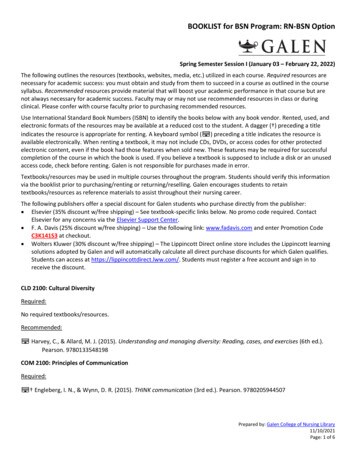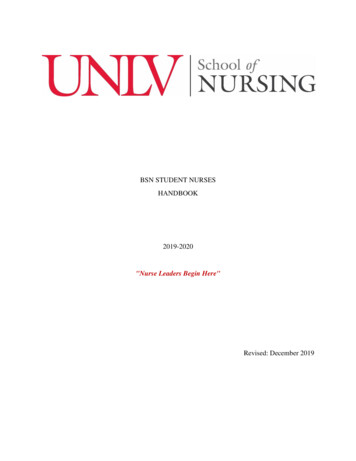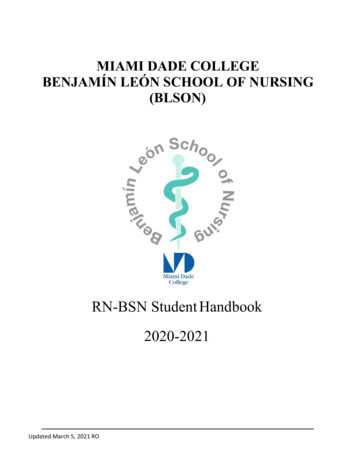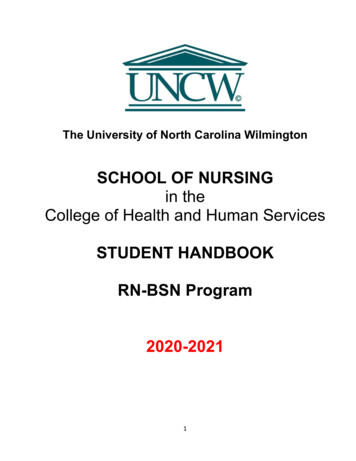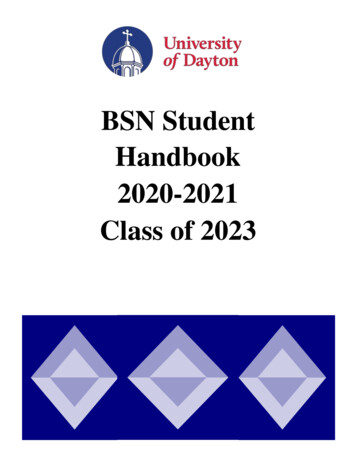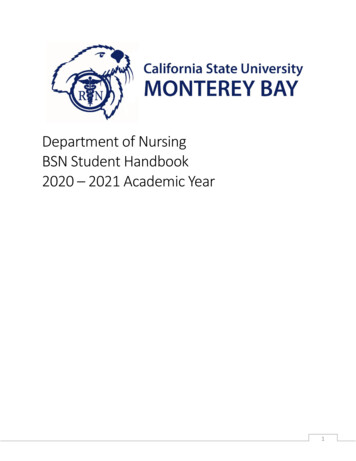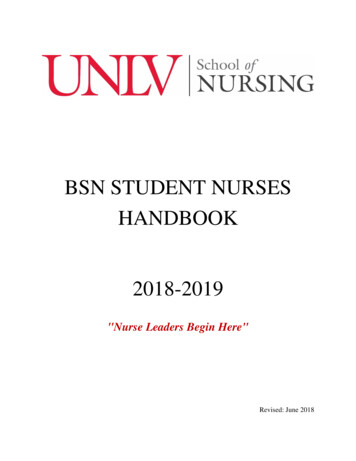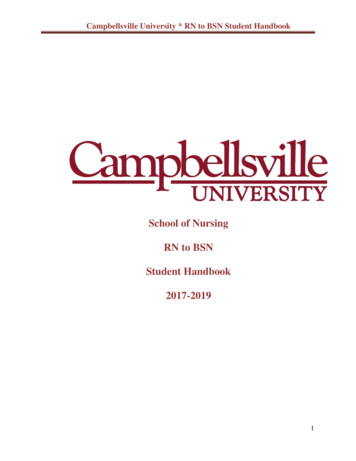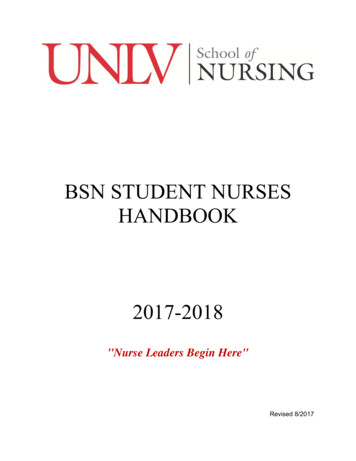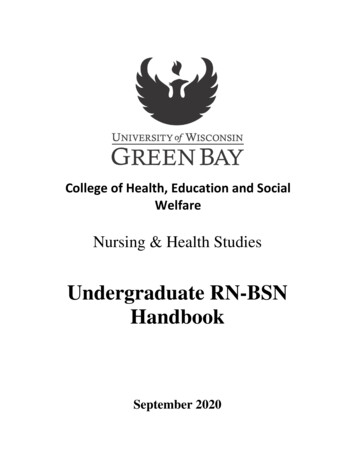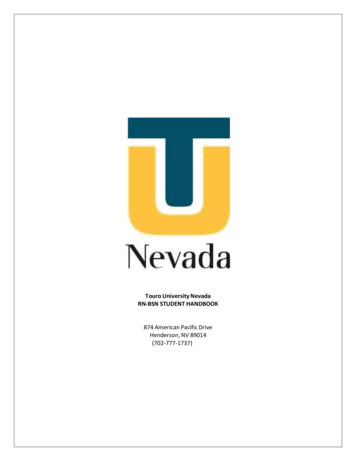
Transcription
Touro University NevadaRN-BSN STUDENT HANDBOOK874 American Pacific DriveHenderson, NV 89014(702-777-1737)
ContentsIntroduction . 4The School of Nursing at Touro University Nevada . 4Mission, Vision, Objectives, and Goals . 6Student Learning Outcomes . 7Program Goals. 8Professional Standards. 8Essential Functions. 9Student Policies . 10Interprofessional Education Coursework . 10Communication with Faculty . 10School Calendar . 11Student Evaluation/Grading . 11Disability Accommodations. 11Withdrawing From a Course . 11Leave of Absence . 11Program Evaluation. 11Letters of Reference. 12Academic Integrity . 12Academic Appeal. 12Grade Appeal . 12Violation of Student Conduct Code . 12Student Complaints. 12Drug Testing & Criminal Background Check Policy . 13Tuition Refund and Withdrawal Dates. 13Transfer Credit . 13Health Insurance . 13Immunizations. 13Health Requirements . 13Professional Liability Insurance. 13Standard Precautions . 13Student Conduct Code . 132
Student Appearance . 13Attendance & Participation . 13Social Media Use . 13Technology . 14LMS (Canvas) . 14Faculty Advisors . 14Transfer Credit . 14Examinations and Assignments . 14Grading . 14HIPAA . 15University Policies . 15Confidentiality . 16Transportation . 16Student as Legal Witness . 17Practice Experiences . 17Maintenance of Current Licensure . 17Activity Logs and Assignments . 17Faculty Collaboration . 17Curriculum Requirements . 18Progression Standards . 19Minimum Grade Requirements: . 19Maintaining Unencumbered RN Licensure: . 19Continuous Enrollment . 19Graduation Requirements . 19Electronic Mail and Netiquette Policy . 20FERPA . 20Student Services. 21Acknowledgement Of Syllabus/Course Requirements . 24Confidentiality Agreement. 253
IntroductionThis handbook is a reference intended to provide accurate information to students and others regardingthe Touro University Nevada School of Nursing. It contains information about the organization of theUniversity, academic matters, policies and regulations, student services and student activities.The provisions of the handbook are subject to changes as a result of official actions of theadministration. Such changes may be without notice and will apply to all enrolled students. The studentshould not consider this handbook to represent a contract between Touro University Nevada and thestudent. The university disclaims any misrepresentations or omissions that may have occurred as aresult of error in preparation or typing.Each student must recognize that he/she is responsible for knowledge of current academic regulations,general and specific requirements, student operational policies contained in this handbook, SchoolPolicies and Procedures, university catalogs, and other official announcements and publisheddocuments of the Programs and University.In the case that a student re-matriculates into the RN to BSN program at any point for reasons includingfailure of a course, withdrawal from a course, leave of absence, or applying for re-admission, thestudent is subject to any and all standards and policies of the cohort to which they matriculate intoThe School of Nursing at Touro University NevadaA History of the School of Nursing: Touro University is a Jewish-sponsored independent institution ofhigher and professional education founded by Bernard Lander, PhD, LHD. The institution derives itsname from Judah and Isaac Touro, leaders of colonial America who represented the ideal upon whichwe base our mission. Lander was inspired by the democratic ethos enunciated by George Washingtonwhen in 1790 he visited the Touro Synagogue at Newport, Rhode Island. The Touro brothers providedmajor endowments for universities, the first free library in this continent, community infirmaries in thenew United States of America, and pioneering settlements in Israel.Touro was chartered by the State of New York in 1970. The first students enrolled in 1971; the classconsisted of 35 liberal arts students. Since those early days, the institution has experienced substantialgrowth.Touro College/University embraces the following schools: The Lander College of Liberal Arts andSciences (Men's and Women’s Divisions); The Jacob D. Fuchsberg Law Center; The Graduate School ofJewish Studies; The School of Health Sciences; The School of General Studies; The School of LifelongEducation; The International School of Business and Management; The Graduate School of Educationand Psychology; and The School of Career and Applied Studies.4
Touro operates degree programs in Israel, Germany, France, and in Russia. Agreements for exchange ofstudents and faculty have been established with the People’s Republic of China. Touro has long beeninterested in medical education. In 1983, Touro established the Center for Biomedical Education, acooperative program leading to an M.D. from the Technion-Israel Institute of Technology, Israel'spremier school of applied sciences. Success in this and other related programs led Touro to explore thepossibility of establishing a college of osteopathic medicine. Touro sought incorporation in the State ofCalifornia, and in 1995 located a campus in the San Francisco bay area. The campus was moved to MareIsland, California in 1997. Touro University California includes the Touro University College ofOsteopathic Medicine, the College of Health Sciences, the College of Pharmacy, and the College ofEducation.As Touro College looked to other potential sites for a college of osteopathic medicine, Nevada waschosen as a potential site due to the current physician shortage in Nevada and the rapidly growingpopulation within Nevada and the surrounding community. The branch campus, TUN College ofOsteopathic Medicine, accomplished matriculation of its first class in August of 2004. Simultaneously,TUN initiated its first Masters in Physician Assistant Studies in 2004. TUN founded the College of Healthand Human Services in 2005 which includes the Schools of Occupational Therapy, Nursing, Education,and Physical Therapy.A regional needs assessment indicated a looming crisis in the availability of nurses to provide care inSouthern Nevada for the burgeoning population, many of whom were of retirement age. A strategicplan was implemented to provide Clark County with a nursing school that would provide graduate leveleducation for students who hold a baccalaureate degree in another discipline or for registered nursesseeking to further their education in the functional areas of nursing administration or nursing education.Efforts were begun in January 2005 to initiate the School of Nursing by hiring the school’s director andby beginning the accreditation process by the Western Association of Schools and Colleges (WASC), aswell as the Nevada State Board of Nursing approval process. Space designated for the School of Nursingincluded a 3600 sq. ft. skills lab, classrooms, seminar rooms, physical assessment rooms, faculty offices,and workstations. This project was completed in November of 2005.5
Mission, Vision, Objectives, and GoalsVision:The vision of the Touro University Nevada School of Nursing is to foster the development ofprofessional nurses at all levels who excel in practice, research, education, leadership, and communityservice.Mission:The mission of the Touro University Nevada School of Nursing is to prepare graduates whodemonstrate outstanding nurse leadership at all levels who uphold the values, philosophy, andpractice of the nursing profession and who are committed to care for patients within an ethical,culturally diverse, and evidenced based framework. The programs are student centered and servesociety through practice, research, education, leadership, and community service.6
Accreditation and Approvals:Touro University Nevada is accredited by the Western Association of Schools and Colleges (WASC).Touro University Nevada is licensed by the Commission on Postsecondary Education in the State ofNevada. The BSN Program is accredited by the Commission on Collegiate Nursing Education.Student Learning OutcomesStudent Learning Outcomes for the RN to BSN Program are established based on analysis of data and arereviewed regularly to ensure that the program is fulfilling its mission. The College of Nursing engages insystematic evaluation and strategic planning focused on achievement of program goals. Studentlearning outcomes for the RN to BSN Program are based on professional standards including: Essentialsof Baccalaureate Education for Professional Nursing Practice, set forth by the American Association ofColleges of Nursing; Competencies of Graduates of Baccalaureate Programs, set forth by the NationalLeague for Nursing; the American Nurses Association’s Standards of Practice, and the GraduateKnowledge, Skills, and Attitudes identified by the Quality and Safety Nursing Education Project.Upon program completion, baccalaureate RN graduates shall be prepared to:1. Integrates concepts and principles from the natural and behavioral sciences, humanities, andnursing into professional nursing practice.2. Applies theory-based clinical judgment and decision making in the provision of caring andcompetent nursing care throughout the lifespan with individuals, families, and communities indiverse settings.3. Uses critical thinking when integrating technological information, research, health information,and client needs information to practice evidence-based nursing.4. Applies concepts of leadership, autonomy, power, and advocacy in designing, implementing,and coordinating nursing care for individuals, families, and communities throughout thelifespan.5. Implements effective interpersonal and communication processes when interacting withinhealthcare structures and collaborating with other healthcare professionals including clients,client families and members of the community in promoting health and well-being for all.6. Exhibits responsibility and accountability as a member of the nursing profession through lifelong learning, personal growth, and leadership to advance the profession for the betterment ofthe global society by improving health care.7. Demonstrates attitudes, values, and behaviors consistent with legal and ethical nursing practice.7
Program GoalsProgram OutcomeStandardHow MeasuredCompletion Rate of ProgramCompletion rate of at least 90%Registrar dataEach TrimesterStudent Satisfaction withProgram attainCourse EvaluationsEach TrimesterStudentCourse Satisfaction ores of mean 3.5scoresquestion 1-5Average score ofof 3.5 on question 7-1190% of loymentwill be employedwithinof Program Outcomeson exit survey6 months after graduation 4.90% graduates’ rateCourse EvaluationsEach TrimesterExit SurveyEach TrimesterPerception ofEmploymentachievement of ProgramOutcomesSatisfaction andHow Often MeasuredAlumni SurveyAnnuallyAlumni SurveyAnnuallyApplicability of TUN Program Satisfaction and Applicability of TUNProgram at 4Professional StandardsTUN SON uses several professional standards and guidelines to inform the practice of teaching andlearning, and to inform the curriculum. These include the Essentials documents published by AACN, theANA Code of Ethics, the QSEN graduate competencies, and the IPE competencies.American Nurses Association Code of Ethics:The SON subscribes to the tenets identified in The Code for Nurses provisions published by the AmericanNurses Association as revised in 2015.1.The nurse practices with compassion and respect for the inherent dignity, worth, and uniqueattributes of every person.2.The nurse's primary commitment is to the patient, whether an individual, family, group,community, or population.3.The nurse promotes, advocates for, and protects the rights, health, and safety of the patient.4.The nurse has authority, accountability, and responsibility for nursing practice; makes decisions;and takes action consistent with the obligation to promote health and to provide optimal care.5.The nurse owes the same duties to self as to others, including the responsibility to promote healthand safety, preserve wholeness of character and integrity, maintain competence, and continuepersonal and professional growth.8
6.The nurse, through individual and collective effort, establishes, maintains, and improves theethical environment of the work setting and conditions of employment that are conducive to safe,quality health care.7.The nurse, in all roles and settings, advances the profession through research and scholarlyinquiry, professional standards development, and the generation of both nursing and healthpolicy.8.The nurse collaborates with other health professionals and the public to protect human rights,promote health diplomacy, and reduce health disparities.9.The profession of nursing, collectively through its professional organizations, must articulatenursing v
League for Nursing; the American Nurses Association’s Standards of Practice, and the Graduate Knowledge, Skills, and Attitudes identified by the Quality and Safety Nursing Education Project. Upon program completion, baccalaureate RN graduates shall be prepared to: 1.
